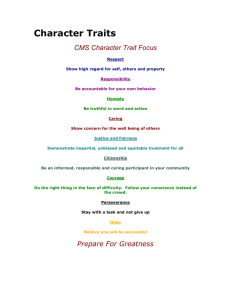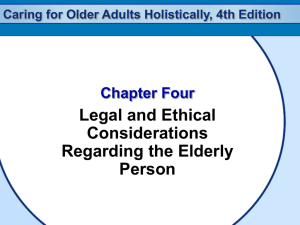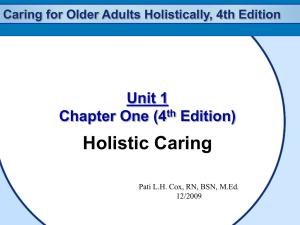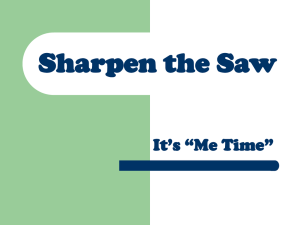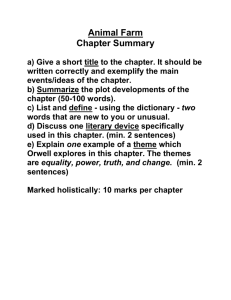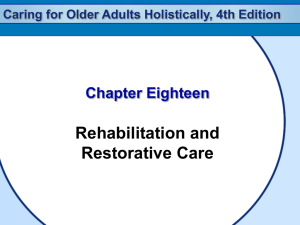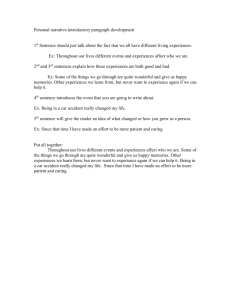Caring for Older Adults Holistically, 4th Edition Chapter Seven
advertisement
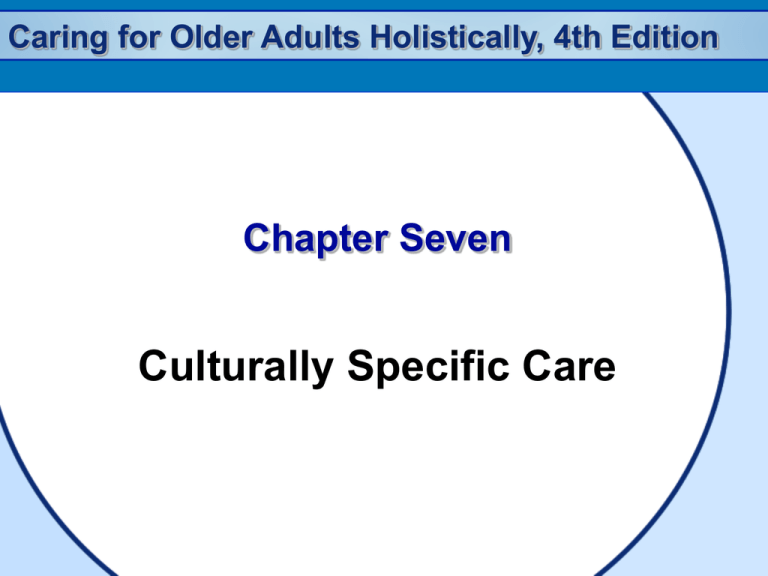
Caring for Older Adults Holistically, 4th Edition Chapter Seven Culturally Specific Care Caring for Older Adults Holistically, 4th Edition Culture and Ethnicity Culture Nonphysical traits we inherit Ethnicity Physical inheritance Transcultural nursing Caring for the cultural and ethnic aspects of people Culturally specific care is the basis for holistic care Older adult population becoming more diverse Caring for Older Adults Holistically, 4th Edition Black Americans Black racial groups from Africa, Jamaica, Haiti, West Indian Islands, Dominican Republic 22.1% live in poverty Due to poverty, older adult blacks die earlier than white counterparts Value wisdom and knowledge of older adults in community Caring for Older Adults Holistically, 4th Edition Black Americans Body, mind, and spirit interconnected Many in black community are Muslim Religious beliefs important to lifestyle, including diet; do not eat pork Sickle cell anemia exists only in black people Higher incidence of death from stroke, coronary heart disease, and prostate cancer Caring for Older Adults Holistically, 4th Edition Native Americans Predominantly live in 26 states, mostly in the western states Many live on reservations but also in urban areas 560 native American tribes in United States Each has own culture, folklore, and folk medicine Importance of Mother Earth and living in harmony with nature Caring for Older Adults Holistically, 4th Edition Native Americans Illness is a price to pay for current or future bad behavior Traditional tribes have medicine man or woman usually called a Shaman One-third live in poverty High incidence of malnutrition, tuberculosis, high maternal and infant death rates, diabetes mellitus, alcoholism Caring for Older Adults Holistically, 4th Edition Native Americans Close family bonds, respect for elders Personal health questions seen as probing and disrespectful Caring for Older Adults Holistically, 4th Edition Asian Americans 12 million Asian Americans in the United States Asian refers to individuals with origins in Far East Asia, Southeast Asia, and India Highest median income of any foreign born group Respect wisdom of older people Address older person with his or her formal name using Mr. or Mrs. Caring for Older Adults Holistically, 4th Edition Asian Americans Never give a command to an older Asian adult; seen as insult Older adults taken care of at home by family May use herbs, acupuncture, acupressure, cupping, spirituality Caring for Older Adults Holistically, 4th Edition European Americans Generally have white skin Each European country its own cultural beliefs European countries have national health care plans that provide socialized medicine Caring for Older Adults Holistically, 4th Edition Hispanic Americans Second largest minority group in the United States Immigrants for Mexico, South and Central America, Puerto Rico, Cuba, and Spain Live in large multi-generational family households More likely to be unemployed compared to nonHispanic whites Caring for Older Adults Holistically, 4th Edition Hispanic Americans More likely than non-Hispanic whites to live in poverty Traditional Hispanics believe that good health is good luck Illness seen as punishment for wrongdoings Use amulets, herbs, and spices Assume responsibility of caring for their elderly Caring for Older Adults Holistically, 4th Edition Hispanic Americans Due to increase in poverty, more susceptible to malnutrition, tuberculosis, and homicide Time is a relative event Older Hispanics slow to come into the health care system Treat “hot” diseases with “cold” remedies Caring for Older Adults Holistically, 4th Edition Jewish Americans 50% of all Jews in the world live in the United States 80% of Jewish Americans have a college education Traditional Jews recognize two aspects of health—spirit and body Maintaining good health is an expectation Modern medicine is encouraged Caring for Older Adults Holistically, 4th Edition Jewish Americans Traditional Jews eat a kosher diet Avoid mixing meat and dairy products Cannot eat shellfish and pork
